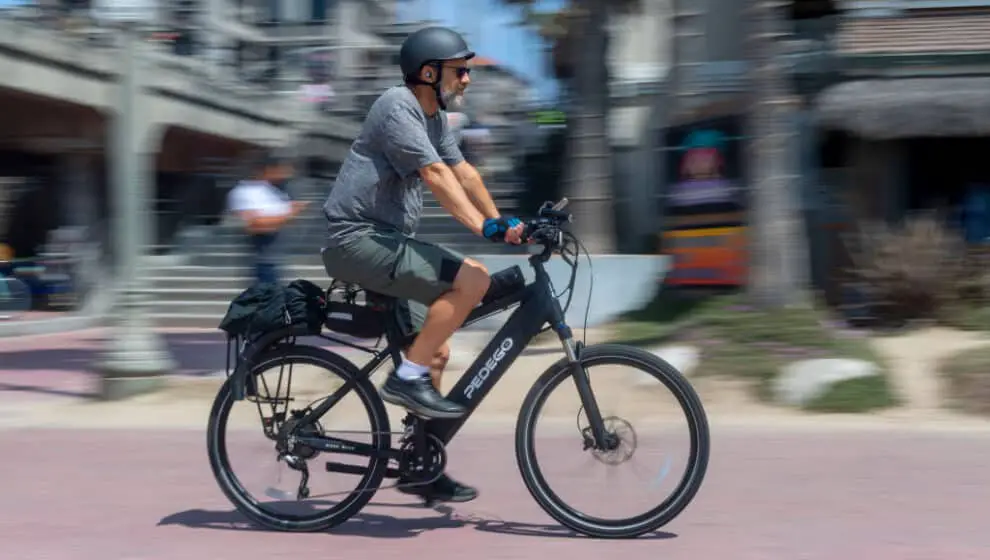As the U.S. pushes toward decarbonization, a new tax credit could soon be issued for electric bikes (e-bikes) as an alternative to cars.
Key Details
- A newly proposed bill called the Electric Bicycle Incentive Kickstart For the Environment (E-BIKE) Act would create a new tax credit for consumer e-bike purchases.
- The proposal would cover up to 30% of an e-bike’s cost, with credits maxing out at $1,500 for e-bikes costing up to $8,000.
- Single filers making less than $150,000 or joint filers making less than $300,000 would be eligible for the full credit, according to Axios.
Why it’s news
E-bikes are bicycles equipped with an electric motor to help riders go faster and farther while using less energy and are an environmental alternative to cars—helping the U.S. push for fewer vehicle emissions.
U.S. lawmakers have introduced the Inflation Reduction Act that gives tax credits to consumers who purchase electric vehicles (EVs) and avoid buying gas-powered cars. One problem is—EVs are more expensive than gas-powered cars, and even with the tax credits, many Americans cannot afford to switch to electric.
A more affordable electric option is e-bikes. Although e-bikes are much more affordable than EVs, they are still considered pricey for a bicycle. Many well-reviewed models cost over $1,000, and more high-end versions go for more than double that.
To help more Americans afford bikes and further the push to electric transportation, four Democratic House members and one Democratic senator recently introduced bills in their respective chambers that would create a new tax credit for consumer e-bike purchases, according to Axios.
The new proposal would cover up to 30% of an e-bike’s cost, with credits maxing out at $1,500 for e-bikes costing up to $8,000. It follows Denver’s successful e-bike rebate program that offered income-qualified residents up to $1,400 toward an e-bike and others up to $500.
Denver’s e-bike rebate program “was estimated to have cut 2,040 metric tons of carbon dioxide in 2022 and saved nearly $1 million in avoided fuel and electricity costs,” Axios’ Alayna Alvarez recently reported.
Many Americans rely on vehicles to get to their destinations, but this new tax credit could boost more consumers to opt for a bike instead of a vehicle, especially in urban areas such as New York City.
“Although we’re seeing more and more people on e-bikes in our communities, more needs to be done to ensure that everybody across our country has access to this form of transportation,” Representative Jimmy Panetta (D-CA), E-BIKE Act sponsor, said in an interview with Axios.
This is not the first time the e-bike tax credit has been introduced. It was originally proposed when the plans for the Inflation Reduction Act were being set in place but was ultimately turned down.
The bill was turned down mainly because many lawmakers were skeptical that the money put into the tax credits would actually help e-bikes become a driving force toward decarbonization, and many still question it. Many lawmakers think bikes will never overpower America’s need for cars.
Plus, opponents argue that providing credits of $1,500 for a bicycle is not a prudent use of taxpayer money, as we are currently spending $80 billion to support Ukraine against attack by Russia and with the national deficit reaching it highest level ever.
Lawmakers are leaning into the success of Denver’s rebate program with hopes of the tax credits pushing more Americans to adopt bikes nationwide.
The push for e-bikes
Walmart is pushing to have 10% of the retailer’s workforce at its headquarters in Bentonville, Arkansas, commute by bike or in any way other than riding alone by 2025 to promote healthy worker commutes.
To count toward the 10%, an employee must use alternative travel modes two or three times a week for a year. Currently, fewer than 1% of Bentonville’s employees meet the company’s goals, according to Walmart.
Having employees carpool and drive bikes and scooters to work will limit emissions released by employees, alleviate some of the traffic on the roads in Bentonville, and make employees healthier, happier, and more productive.
The new tax incentive for e-bikes will help more workers afford electric bikes and help Walmart push forward with its goal. If the goal is met and helps boost worker productivity and happiness, it is likely that more businesses will institute similar goals in the future.
